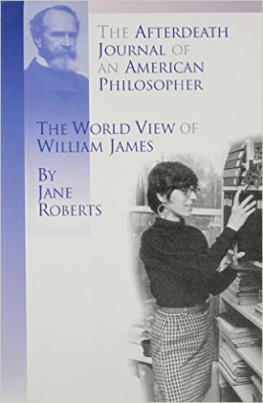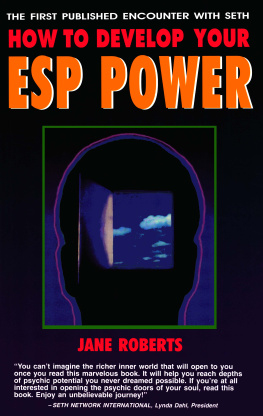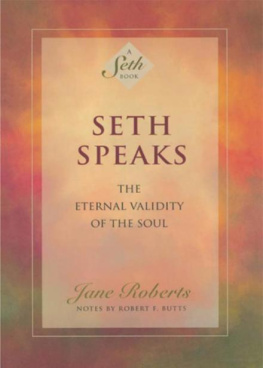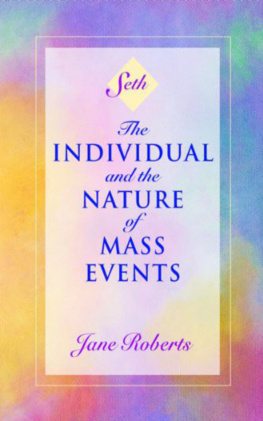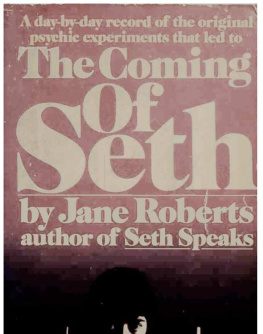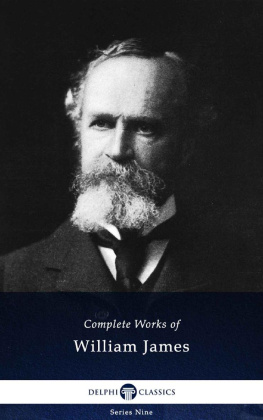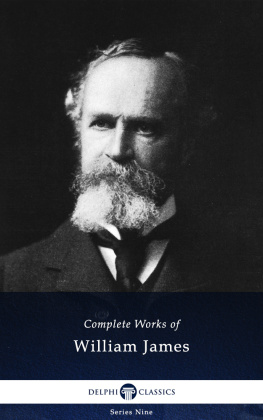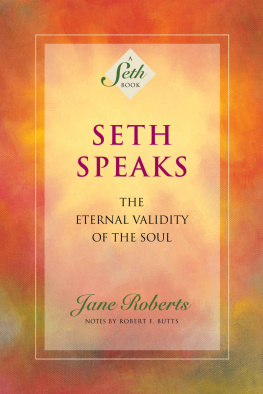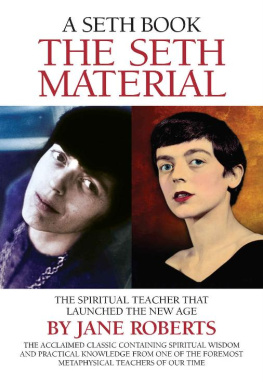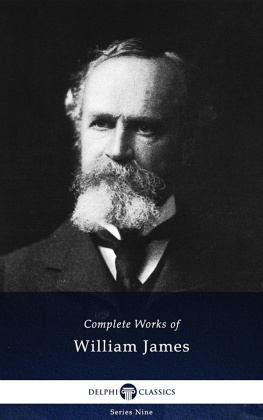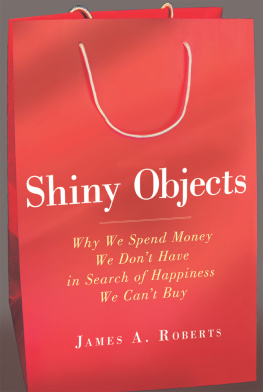Introduction
Front-DoorPeople, Back-Door People, and World Views
I find myself with still another unconventional manuscript, left at theback door of my mind. The pages fluttered down into my awareness one by one, asif left by some invisible newspaper boy, day after day; the latest installmentsin a steady line of communications that seem to come from strange lands.
Without painting this analogy in too glowing colors, I'd like to pointout my feeling that the conscious mind is like a house of awareness, with anelegant front door through which we receive usual callers and messages.("Hello. How are you? State your name and business.") This frontentrance is swept and well tended; to its doorstep come all official magazinesand newspapers. The shrubs of our beliefs are trimmed and pruned, and theregular mailman, whistling cheerfully, leaves the mail at the proper, anticipatedtimes. Neat curtained windows look out to the well-organized streets of theworld, and we're told that all messages must come to us through that frontdoor; the only entranceor exit.
But no matter what we're told by all of the officials and authorities,we seem to remember a secret back door from the time of our childhood; a"magic" entrance that we discovered when we were left by ourselves,perhaps on rainy afternoonsa door that opened into other worlds. Vaguely wemay recall finding and opening that door on innumerable, nearly forgottenoccasions. We may have sensed messengers coming and going; once or twice we mayeven have found strange packages or papers on the back-door stoop, wet withrain as if they'd been waiting there for a long time. But the next time welook, the door is invisible. The wall of awareness is smooth, and we see onlythe whitewashed walls we've been taught to expect.
Some of us are just too stubborn and curious to ignore those unofficialevents, so symbolically speaking at least, while I keep my front door welltended, I've learned to watch at the back door of my mind. Now and then I standon the. mind's back porch, and sometimes I take a few tentative steps downunofficial paths that lead to unexplored psychological lands that just mightcorrelate with other realities than the one we know.
The Afterdeath Journal of an American Philosopher wasautomatically delivered, then, at that back mental doorstep; the installmentsappearing day after day, while I went about my business, winter turned tospring, and the regular magazines and papers brought by the postman kept meup-to-date on the official world.
Those periodicals are easy to read. They're written for thefront-door people. But we're all both front-door people and back-door people,whether we know it or not. The trouble is that we know how to read theimportant news that comes to us through the exterior world, but often we justdon't know what to do with the equally valid messages that come by theunofficial back route.
For one thing, the messages left by inspiration or the intuitions arehighly personal, intimate; left at our back doorstep and no other, and theyhave to be read by the part of the mind that is peculiarly suited to theirtranslation. They may deal with symbols, for example, instead of the good clearalphabets we're used to. Sometimes their messages may even seem to contradictthe news that comes in the front door, and not only can't we confirm the datawith our neighbors, but we have to restructure our own thinking before we caneven accept it ourselves.
So at first I didn't know how to interpret this present manuscripteither. Should it be taken literally or symbolically? I tried to put togethermy knowledge of reality as it comes to me through official and unofficialsources of information, and to use all of my intellectual and intuitiveabilities to find the answer.
Our ordinary consciousness is tuned toward our front-door callers, andwhen our physical senses are stimulated, the front doorbell rings and werespond to whomever or whatever wants our attention.
Usually we'reso busy responding to those messages that if the back doorbell rings, we don'tnotice. I've learned to tune my consciousness toward the back of my mentalhouse and always to keep a portion of my attention focused in that direction.
In a manner of speaking, I have my own messenger from those unknownpsychological realms.
Like many people, my husband, Rob, and I have a small yard in the rearof our house; but beyond that, there are hills and forests. In my analogy theserepresent the unofficial areas of the psyche, down whose natural untended banksrush winds from other psychological skies, and messages tumbling like smallspeckled exotic stones.
My trance personality, Seth, comes into my consciousness from thoseother, inner, landscapes. Twice a week he comes through my mind's back door andtakes an honored place in our living room. I go into trance and he begins tospeak, while Rob takes notes. Seth writes his own books in this fashion,explaining the greater realms of consciousness that exist outside our cozyvillages of mind.
It was in the middle of one such session (the 717th for November 4, 1974)that I first became "acquainted" with William James, the well-knownAmerican psychologist and philosopher who died in 1910. This is what happened:Mentally I saw a small paperback book, opened midway through, and I knew thatit was titled The Varieties of Religious States. At first the book wasin miniature, but it grew larger, so that I could read it clearly, sentence bysentence. At the same time I knew that somehow the book was written by WilliamJames. I was already familiar with James's name, since several years previouslyI'd partially skimmed his Varieties of Religious Experiencea book thatRob really enjoyed, though I didn't, particularly. James's reputation as apsychologist also came up in our reading matter now and then. I explained toRob what was happening. Then, while he took notes, I read out loud the pages Isaw.
We both took it for granted that the image of the book in my mind's eyewas symbolic, but the message I read was quite literaland literate. I foundJames more personally likable from these passages than I did from the real bookof his I'd read. More than this, I felt that the copy itself also containedJames's emotions and feelings, which were somehow "played back" whenyou read the words.
This wasn't all. As described in my own book Psychic Politics, duringthat same session other material also came throughsupposedly from another deadpsychologist, Carl Jung. I was intrigued by James's quaint, rather elegantprose, and rather taken aback by the uneven exuberance with which the Jungmaterial showed itself. Mostly, my front-door mind was startled by theimplications of the entire affair. So we just let the whole thing slide by.

